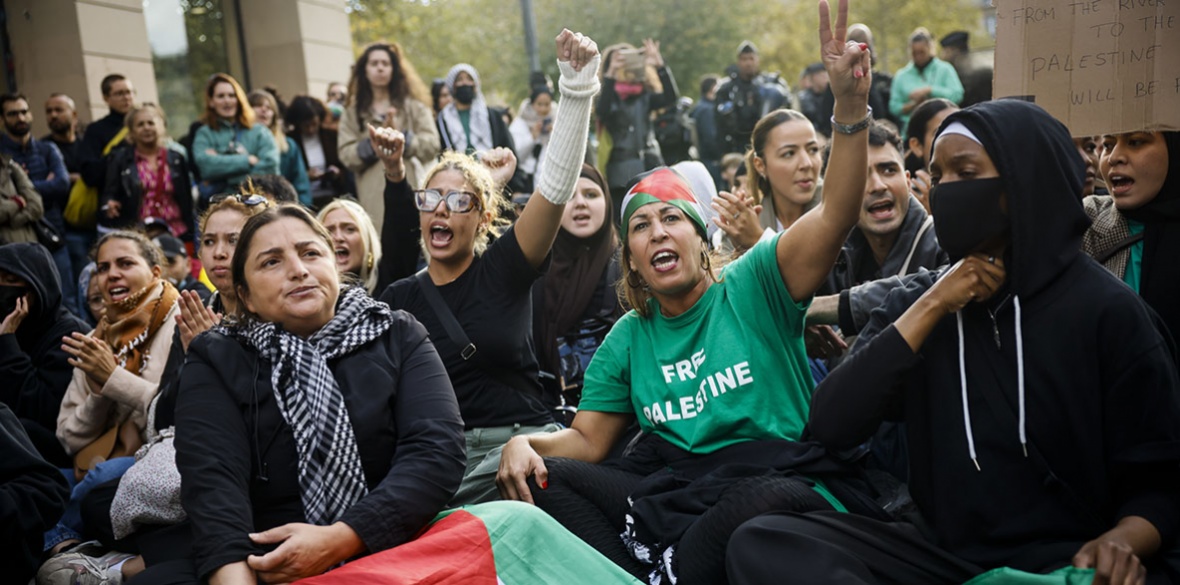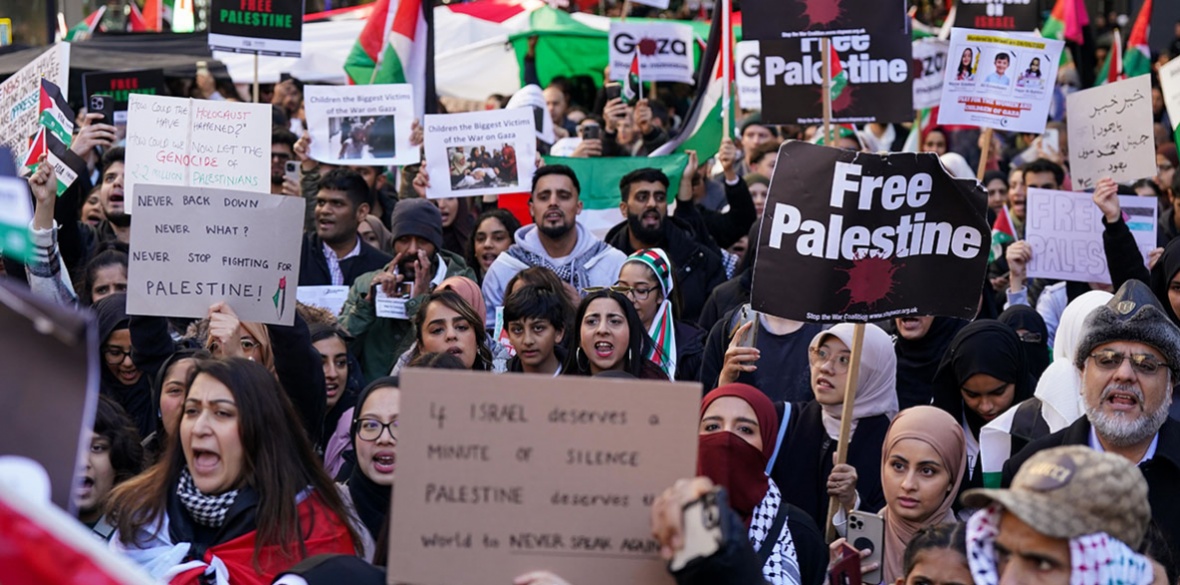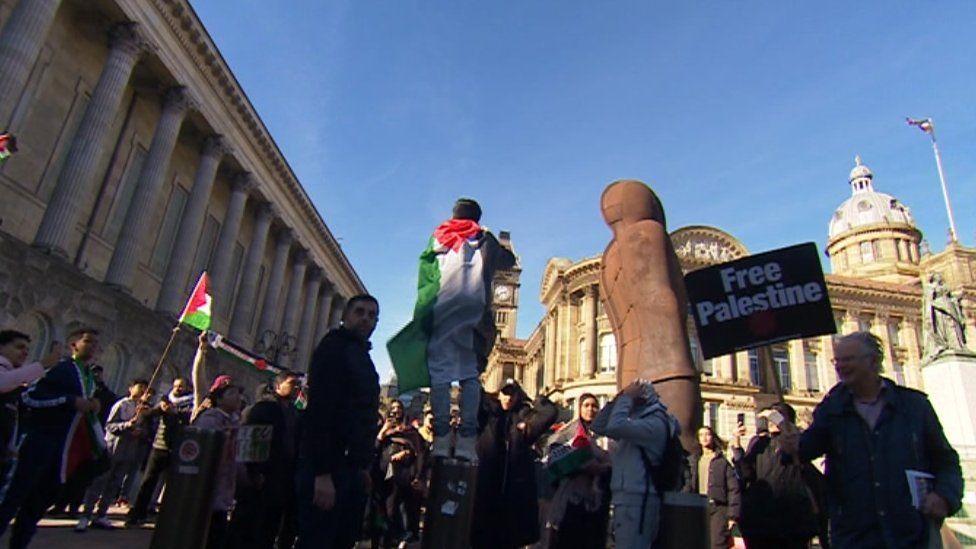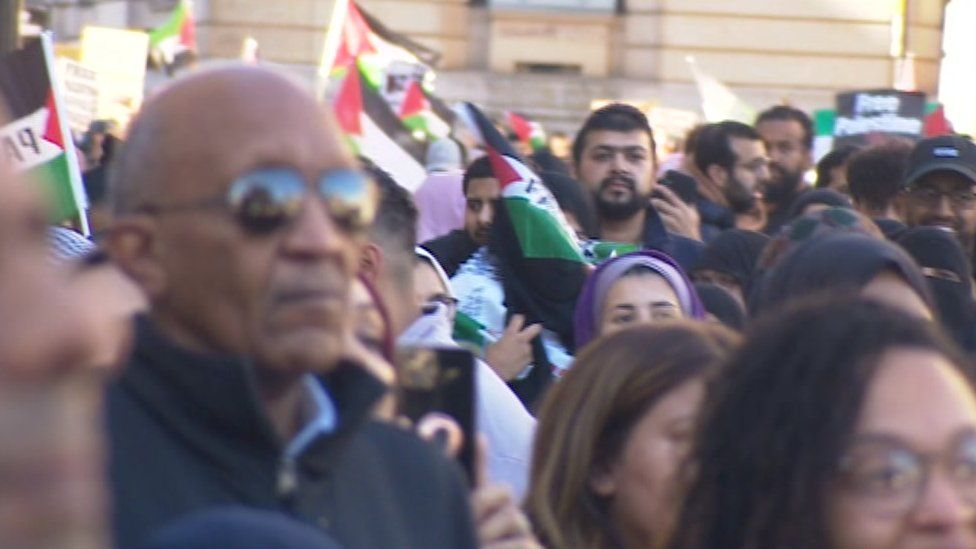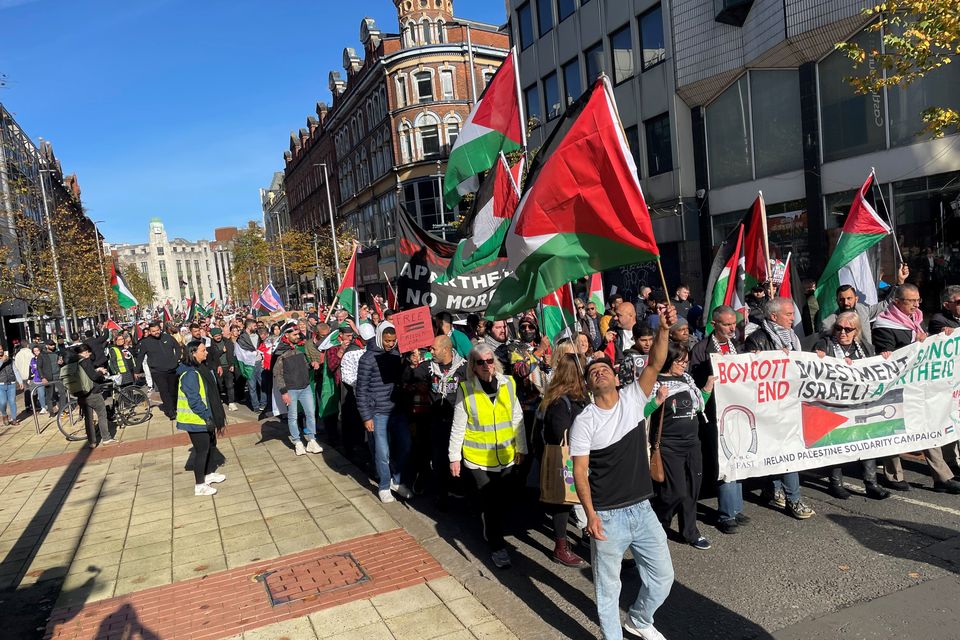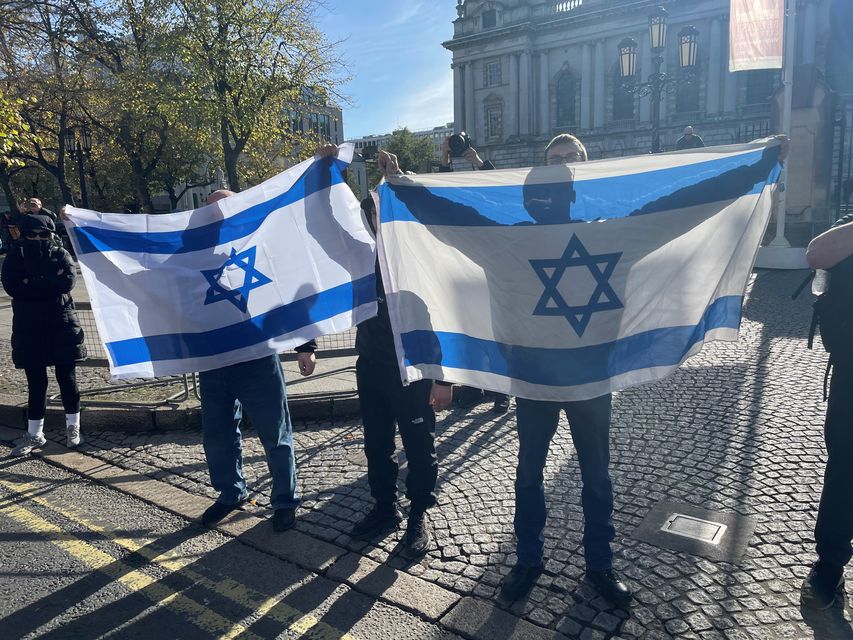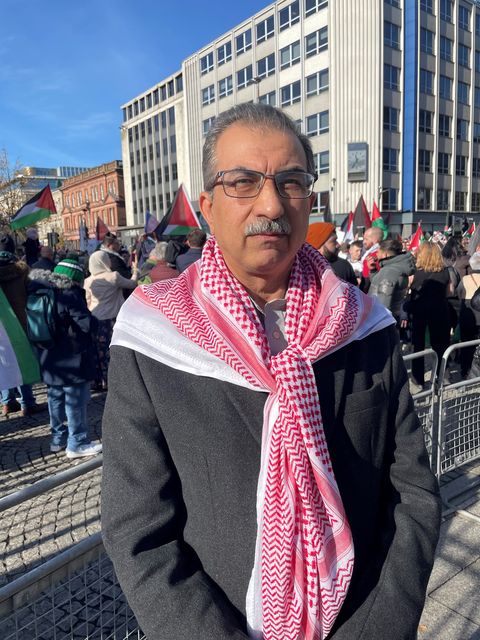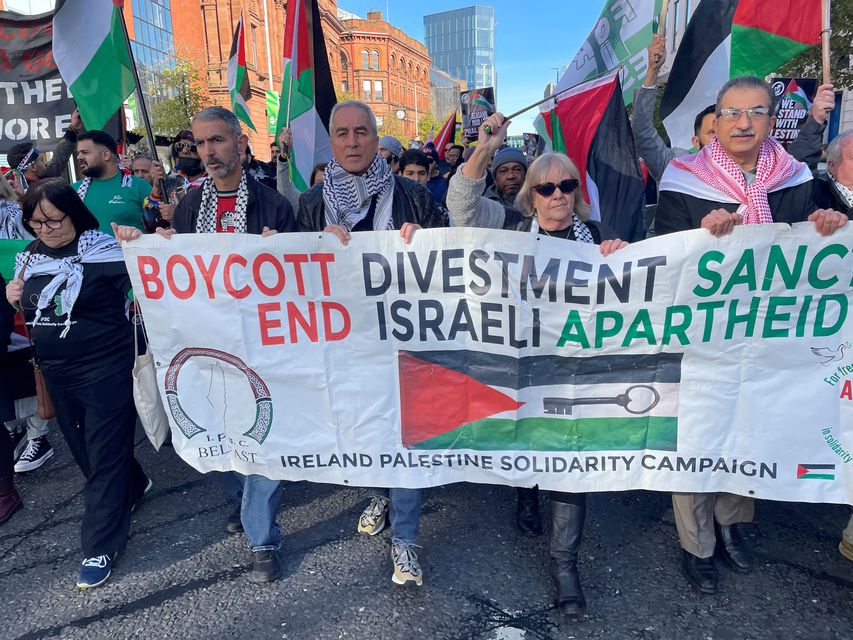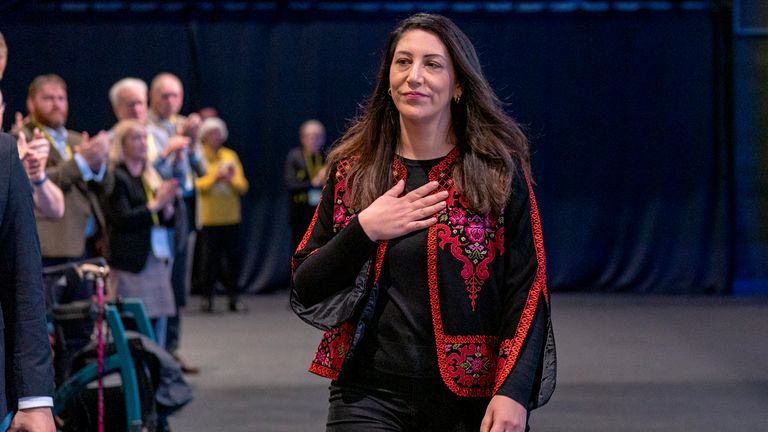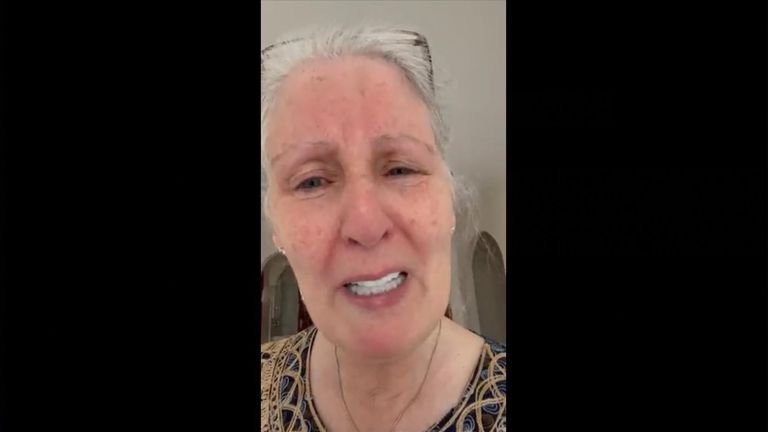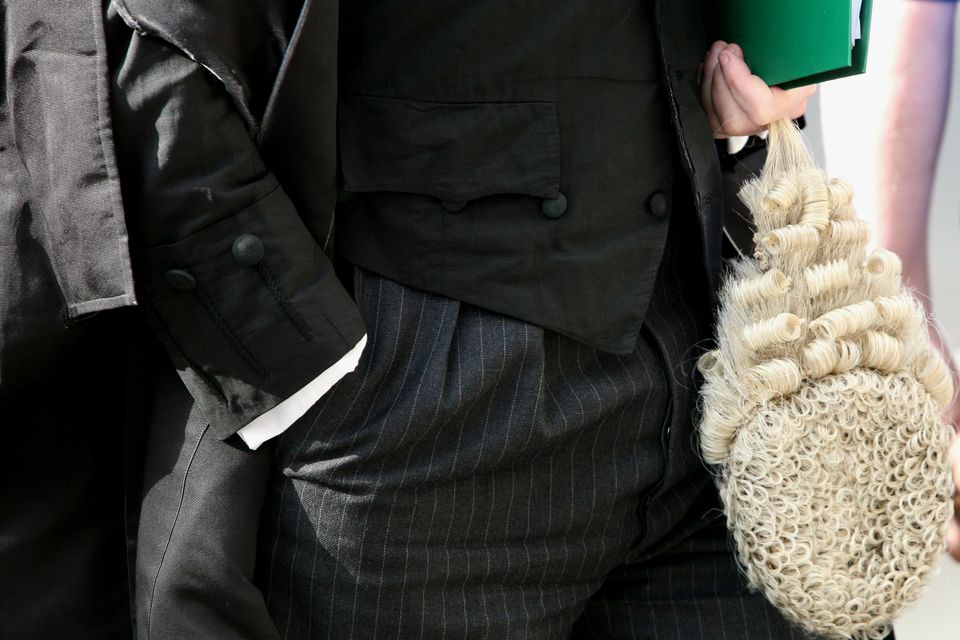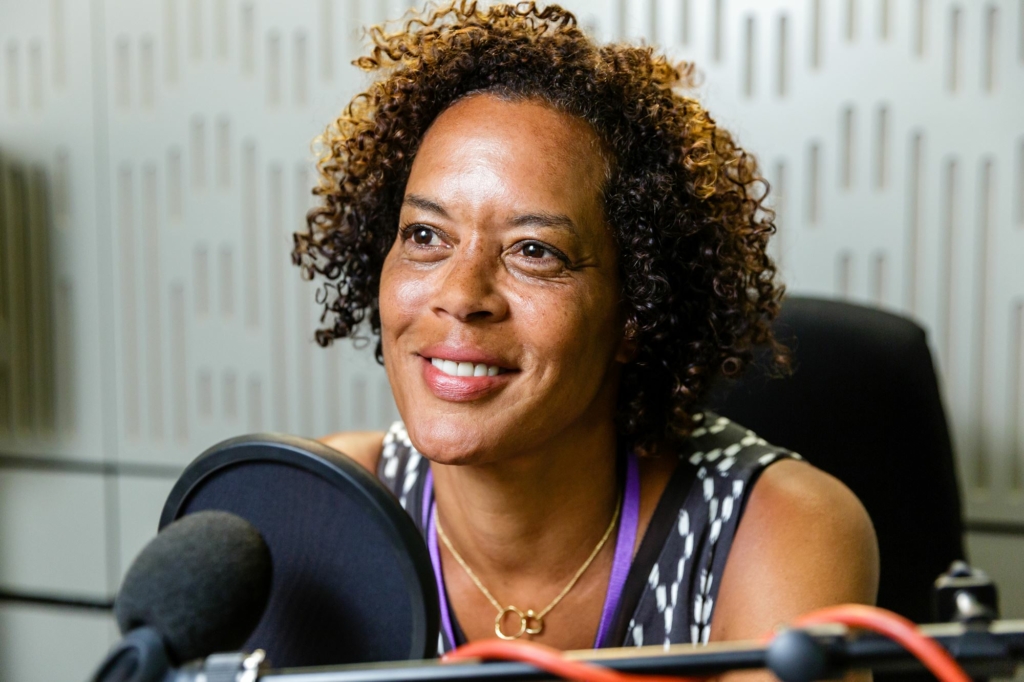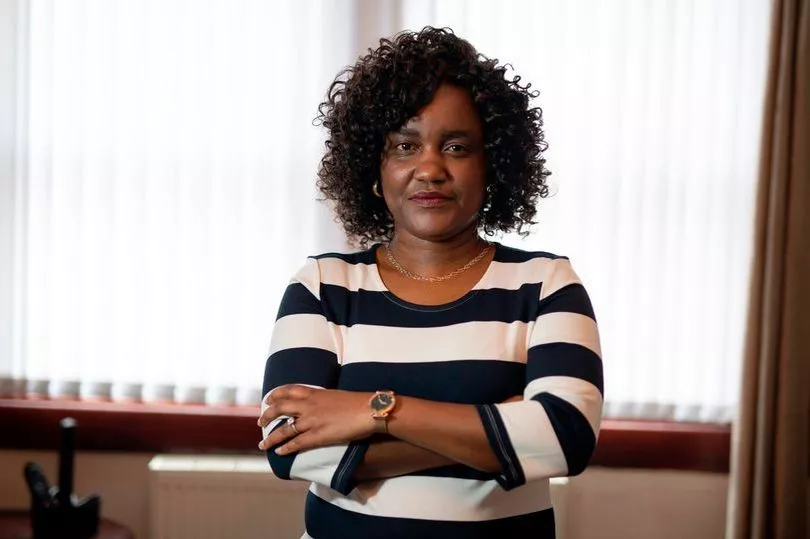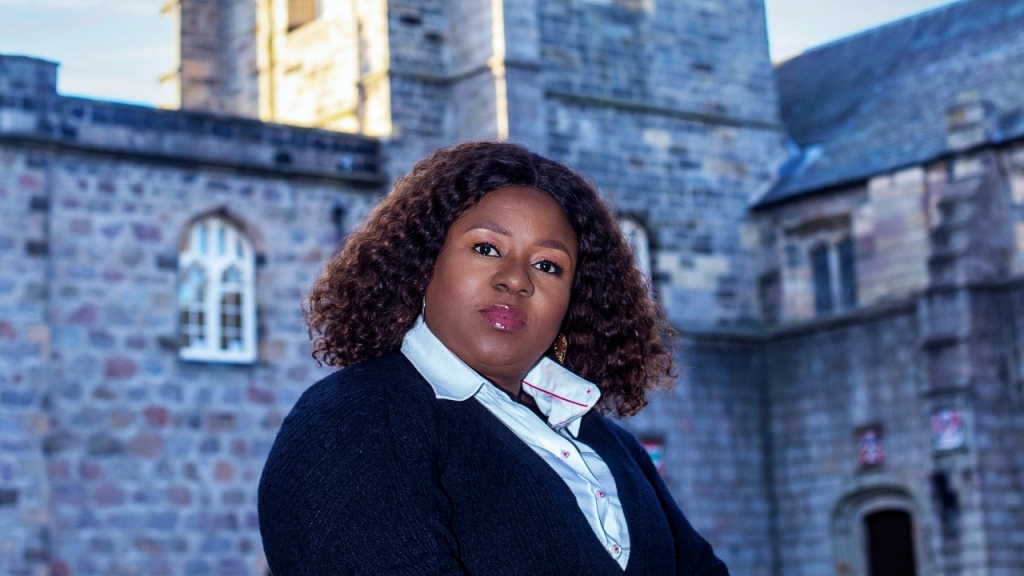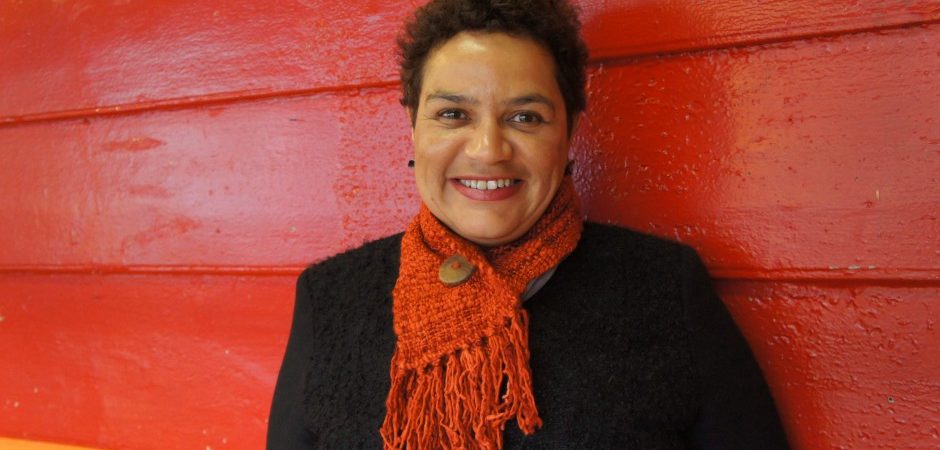October 15, 2023
Gaza is home to a dense population – approximately 2.3 million people in a stretch of land 25 miles long and 6 miles wide. Normally, most Gazans can’t leave this enclave. It has become the world’s largest open-air prison.
Since Saturday October 7th Israel has dropped more than 6,000 bombs in Gaza, something it proudly boasts. No regrets. But on Friday October 13th, in northern Gaza, for a moment the bombs stopped; in their place hundreds of thousands of leaflets silently floated to the ground.

(Source: Twitter)
It was an eerie sight. Starting as white specs against a pure blue-sky, they floated over damaged rooftops and glided past destroyed buildings, before landing on blackened debris and smashed rubble and blood-stained streets. For a moment you could be fooled into thinking angels were descending from heaven to collect Gaza’s murdered. But not even angels are permitted into this part of besieged Palestine.
The leaflets were an eviction order notifying the residents of North Gaza and Gaza City, approximately 1.1 million people, to move south beyond Wadi Gaza, a river valley in the centre of Gaza.
Gaza City is the most populated city in the Palestinian state and emptying it is like asking the US to vacate New York. And in the way that New York is symbolic for Americans, Gaza City holds an emotional significance in the Palestinian psyche. Abandoning this place will be traumatic – staying will be fatal. This heart-breaking choice has plagued Palestinians for generations and is responsible for shrinking their homeland to a meagre twenty-two percent of its pre-colonised self.

The cycle of violent land theft and forced eviction of Palestinians began in 1948 when Palestine was partitioned displacing between 750,000 to 1 million Palestinians, or about 70% of the Indigenous population. The partition was carried out under the auspice of the United Nations and would probably be considered illegal today as it was ‘contrary to the will of the Palestinian people and their natural right to their homeland, and inconsistent with the principles embodied in the Charter of the United Nations.’ This catastrophe, or Nakba in Arabic, is commemorated every May 15th. In the most bizarre twist, the United Nations itself began commemorating the Nakba in 2023 so it could memorialise the ‘mass displacement of Palestinians from their homes in 1948 that coincided with the founding of Israel.’ The irony of such a gesture seemed to be lost on all but the Palestinians.
Hanan Ashrawi is a Palestinian politician, legislator, activist, and scholar. She has drawn praise from Mary Robinson, the former United Nations Commissioner for Human Rights, and from Archbishop Desmond Tutu, and she is vocal about the injustices inflicted on Palestine and its people. In 2001 Ashrawi gave a speech at the United Nations where she explained how the Nakba wasn’t in fact a single event but a process which holds Palestine hostage to the persistence of colonialism, apartheid, and racism. She called this the ‘on-going Nakba.’
Yesterday Israel ordered the part evacuation of another sovereign state; Palestine is recognised by 137 out of a 193 countries, and did so through threat and intimidation. It is forcibly displacing a population towards Gaza’s already heavily crowded southern border. Beyond that border is Egypt’s Sinai Peninsula – an expanse of desert, largely vacant of inhabitants. It’s tough terrain and would make for harsh living. And it’s the sort of place where people are easily forgotten.
On Friday September 23rd of this year Israeli Prime Minister Benjamin Netanyahu spoke at the United Nations General Assembly. About halfway through his twenty-five-minute speech he raises a map. It is A3 in size and outlines the Middle East. The territory of Israel is marked in solid black and completely consumes Gaza. It’s like Gaza never existed. A land and its 2.3 million people vanished.
 (Source: @ShahadehAbou)
(Source: @ShahadehAbou)I always hoped Ashrawi’s nightmare of a never-ending Nakba was metaphorical, but I worry it’s about to be enacted again – this time across the Sinai Peninsula. I wonder how the United Nations will commemorate this catastrophe in the coming years?
©2023 Sul Nowroz
Six reasons why you should support Palestine
Key arguments about the Israeli state and the Palestinian resistance
Sunday 15 October 2023

Tens of thousands on the streets of London on Saturday stand with Palestine (Picture: Guy Smallman)
1. Israel was formed out of imperialism
Britain played a crucial role in creating Israel in the interests of its Empire. In 1917, Tory foreign secretary Arthur Balfour publicly pledged to recognise a “national home for the Jewish people” in Palestine. Colonising Palestine was part of Britain’s project to reshape its influence after the fall of the powerful Ottoman Empire and the First World War.
Sir Ronald Storrs, the first British military governor of Jerusalem, said the Zionist state would be a “little loyal Jewish Ulster in a sea of potentially hostile Arabism.”
These political aims also served to satisfy the plans of the Zionist movement, which had begun to emerge in the late 19th century.
To escape the violence of European ruling classes, Zionists argued that Jewish people would only be safe in an exclusively Jewish state. Palestine, with its historic and religious roots, was just one suggestion.
Other possible locations for a new state included areas in Argentina, Uganda, Azerbaijan, and “empty” land in the US.
Zionism, which many Jewish people rejected, was never about seeking sanctuary for Jewish people. It has always been a colonial project to create a state where Jews are the majority, which is only possible through the expulsion of any other people from the land.
The Balfour Agreement allowed British Zionist administrators to implement these colonial plans. One of these architects of colonisation was the first British high commissioner in Palestine Herbert Samuel.
As commissioner of Palestine from 1920, he passed a series of laws that allowed Zionist settlers to seize land from Palestinians.
From 1919 to 1923, the number of Jewish settlers doubled. The British colonists established the Department of Commerce and Industry to offer generous long‑term loans to Jewish businessmen and farmers.
2. Zionism meant ethnic cleansing
The new Zionist state developed a systematic plan to grab Palestinian land and ensure a Jewish majority.
At least 850,000 Palestinians were forced from their homes during the Nakba, meaning Catastrophe. Half of their villages and towns were “wiped out, leaving only rubble and stones”.
Supporters of Israel still say that no such plan existed. They claim Palestinians fled because of a war with neighbouring Arab states.
But the Plan Dalet was an approved military operation to clear out Palestinians. The techniques it used were clear—“By destroying villages (by setting fire to them, by blowing them up, and by planting mines in their rubble).
“In the case of resistance, the armed forces must be wiped out and the population expelled outside the borders of the state.”
Settlers rolled oil barrel bombs into villages, as they drove vans with loudspeakers telling people to flee for their lives. These techniques developed in the months leading up to Israel’s formal creation, as well as after.
The Zionist army, the Haganah, carried out atrocities and massacres. In the city of Haifa, where Jews and Arabs both lived, the Haganah besieged Arab areas with heavy shelling and sniper fire.
The brigade’s commander Mordechai Maklef—who later became the Israeli army’s chief of staff—gave simple orders. “Kill any Arab you encounter. Torch all inflammable objects and force open doors with explosives.”
David Ben-Gurion, the then-prime minister of Israel, signed Israel’s founding declaration on 14 May 1948. The UN ratified the declaration, stating that 55 percent of Palestine would be given to Zionist settlers.
Before 1948, just 600,000 Jewish settlers were living in Palestine. This number almost doubled in three years following the Nakba. The first country to recognise Israel as a state in 1948 was the United States—Israel’s biggest imperialist ally.
3. How Palestinian resistance was formed
During the 1950s, the slow process of building a national liberation movement gathered pace in the refugee camps scattered around the region.
Palestinian refugees accessed meagre support from UN agencies but were denied political rights by their host countries. Wealthy or middle class Palestinians gravitated towards the Gulf, where they played key roles in public services and the media.
It was among these circles that a new Palestinian movement was born. Fatah was founded in 1959. Among its founders were Yasser Arafat and Mahmoud Abbas. Abbas is the current president of the state of Palestine.
One of Fatah’s core principles was “non-interference”—Palestinians should not take sides in the struggles within the Arab countries they live in. Deeply problematic but it meant it focused on Palestinians’ armed resistance against the Israeli state, inspired by the guerilla tactics of other anti-imperialist groups.
The Six Day War in 1967 saw Israel obliterate a coalition of Arab states, including Egypt, Syria, and Jordan. By the end of the war Israel seized control of Gaza, the West Bank, the Golan Heights and the Sinai Peninsula. Israeli troops defeated and captured resistance fighters, many of which were exiles.
But it suffered an embarrassing defeat at the hands of Fatah fighters in Karameh in Jordan in 1968. Fatah began to dominate the Palestine Liberation Organisation (PLO), set up by the Arab regimes in 1964 as the official representative of the Palestinian people.
The Fatah-controlled PLO moved away from the idea that it was possible to liberate the whole of Palestine. It made concessions to the idea that a mini-Palestinian state alongside Israel would be enough and was drawn into false peace negotiations.
The leaders of the PLO, because of their own class position, imagined they could be part of the Palestinian ruling class, closely backed by Arab leaders.
4. The first Intifada changed everything
From the 1950s until the 1980s, political and military direction lay with the Palestinian leadership in exile, not within the Occupied Territories themselves.
In 1987 frustration with the misery of life under occupation exploded in an uprising, or Intifada. It took both the Israelis, the US and the PLO leadership by surprise.
The First Intifada revealed the brutality of the Israeli occupation to the world. Protests were sparked after Israeli forces rammed their truck into a line of cars, killing four Palestinians in the Jabalia refugee camp in December.
Only a day after their funeral, attended by 10,000 people, Israeli soldiers shot into a crowd of protesters. They killed 17-year-old Hatem Abu Sisi.
Across the Occupied Territories Palestinians rose up and mobilised protests, riots, strikes and created networks of local committees to provide health care and education.
From 21 December, Palestinian workers struck mainly in the fruit and hospitality industry. The Palestinians’ ferocity during the First Intifada was impossible for the Israeli state to contain for more than five years.
The First Intifada ended because of the promise of peace talks with the Israeli state in the early 1990s. The PLO had never seen the road to liberation as being through revolts of ordinary people and was happy to be part of these talks.
5. The peace process was an imperialist trap for Palestine
Supposed “peace deals” brokered by the West have always been a sham. One such was the Oslo Accords signed in 1993.
The true purpose of this was to enshrine Israel’s hold over land under the pretence that Palestine would be handed a state that could exist alongside Israel.
The deal was accepted by the leaders of the PLO after they had squandered the opportunities won by popular struggle through the Intifada. But Palestinian academic Edward Said called the Accords “an instrument of Palestinian surrender”.
PLO officials were satisfied with the weak promise of a small amount of Palestinian self-governance in the West Bank and Gaza Strip. These were to be implemented over five years.
Meanwhile the rest of what was Palestine would be kept under Israeli sovereignty. The newly formed Palestine Authority (PA), dominated by Fatah, was handed 18 percent of the occupied West Bank. Around 22 percent would be supposedly governed by the Israelis and the Palestinians together.
The rest—66 percent—would be left to the Israelis, including control of imports and exports. The Oslo Accords made it even more impossible for Palestine to survive without Israel.
Border closures strangled the Palestinian economy. Before the Accords, one third of Palestinians in the West Bank and Gaza Strip worked in Israel. By 1996 that had collapsed to 15 percent, while earnings from work in Israel dropped from 25 percent of Palestinian GDP to 6 percent.
Today the PA might have some appearance of power. It has an elected body of 132 representatives. It even has its own police force—a condition of the Oslo Agreement.
But Israel still does what it likes in areas assigned to Palestine. The PA, controlled by those who once dreamed of waging armed resistance against Israel, is a mechanism for maintaining colonisation.
Hamas soon became the party representing the disillusionment of the Palestinian people, offering a more radical and military alternative that the PA. Hamas was central to the Second Intifada.
This sparked after the Camp David Summit in 2000 between Israeli prime Minister Ehud Barak and Yasser Arafat, PA chairman, failed to achieve anything.
6. Only a single state for Arabs and Jews offers a solution
The Palestinians have suffered more than 100 years of violence, brutality and racist laws at the hands of the Zionist settlers and their backers. Promise after promise has been broken, while Israel has continued to snatch more Palestinian land for its own.
While Palestinians have been left with worse than nothing, Israeli settlers have been emboldened. A so-called two-state solution has failed. It will continue to fail because the Israeli state is still committed to building a Jewish majority and expunging all Palestinians.
Israel will never willingly hand the Palestinians a state from the land it has stolen or allow return for the millions of Palestinian refugees.
Today, the Israeli state continues to strengthen its own one-state solution. Israeli settlers, backed by the Israeli government, seize homes and land from the Palestinians.
Socialists must argue that a secular and democratic state where Muslims, Jews, Christians and others live together is possible. This kind of state existed before Balfour’s agreement, so it is possible again.
Even if the Oslo Accords had produced a viable Palestinian state and dismantled Israeli settlements in the West Bank and Gaza there would still not be justice.
This would not address the historic crime on which Israel’s existence is based. It would also leave in place a racist, colonial state, armed by US imperialism to be its watchdog in the region.
But winning this will take revolutionary upheaval across Palestine and the Middle East region that can upend the Israeli state and its imperialist backers.
Free Palestine: Why we say by any means necessary
Following the assault on Israelis by the Palestinian resistance, there are those who say a violent fightback is never justified. Isabel Ringrose explains that the oppressed have a right to take up arms against their colonisers

Independence Day celebrations in Algeria following years of struggle, violent and otherwise
Uprisings against colonial rule are violent because violence is an inherent part of imperialism and colonialism.
That’s why the resistance by Palestinians against the racist Israeli terror state is wholly justified. All the deaths, horrors and destruction—all of them—are rooted in violent Israeli occupation and dispossession. And this is the case not just in Palestine. Wherever imperialism has gone, violence has followed.
Colonialism means states viciously enforcing their rule, snatching resources for themselves and subjecting citizens to dire inequality and reigns of terror.
That violence took its form in how 48 million died in major famines between 1770 and 1943 in India caused by British colonial rule. It manifested in over a million dying in famines manufactured by the British in Ireland.
Violent colonisation led to the elimination of Indigenous populations by the Spanish and British and to European nations carving up and ransacking Africa for their own greed and domination.
Such violence led to violence in return from those in revolt. But their violence was on a massively smaller scale compared to the slaughter by the imperialists.
The anti-imperialist violence was a fight to liberate society from a system of torture and murder. The violence of the oppressed is therefore utterly different to the violence of the oppressor.
The slave who murders the slave master, who torches the master’s house and perhaps kills the “civilian” slavers’ family and servants is wholly justified in their act.
Palestinians in Gaza breaking from their open-air prison for the first time were taking part in an act of liberation against Zionist and the imperialism that defends it.
Yet every time the oppressed have confronted the violence of the system and retaliated, they have been met with criticism and moral condemnation.
Resistance should stay peaceful, liberals say, and not have a bloody side. Or else, they warn, it is comparable to the violence of the oppressor.
But why should the oppressed listen to this advice? Why should they sit back and take whatever violence their oppressors deem necessary? Should the Algerian people have remained peaceful when the French invaded in 1830, stamping their authority on the country through violent massacres and rapes?
France killed up to three million Algerians in 30 years. Up to 1951 the French lost just 3,336 soldiers. After an anti-colonialist demonstration in 1945, with the movement growing after the Second World War, French authorities killed some 40,000 in Setif.
The horror led to an armed fight and sparked the war for independence nine years later. The independence-fighting group the National Liberation Front (FLN) attacked military and civilian targets of the French state and the French settler middle class, the Pied Noirs.
Anyone associated with France was a target. More Algerians fell behind the pro-independence fighters as France ramped up its violence with torture, bombardment and napalm.
The FLN and its supporters advocated for violent revolution. Independence fighter Frantz Fanon described colonial society as one entirely shaped by violence.
He wrote, “Colonialism is not a thinking machine. It is violence in its natural state, and it will only yield when confronted with greater violence.” We disagree that only “greater violence” can win.
We stress the crucial role of organised workers, strikes and workers’ militias in an insurrection. But Fanon was right about the core of colonialism.
Random raids, shootings and bombings by the FLN led to the French declaring a state of emergency. The massacre of Pied-Noirs european settlers in 1955 in Philippeville was the first major FLN attack on non-military and government targets. Some 123 people were killed, with the French then killing 1,273 Algerians.
By 1956 there were 500,000 French troops in Algeria. The FLN had 20,000 with fewer weapons. The French guillotined two FLN fighters in Algiers in June 1956 so in retaliation, the FLN shot 49 Europeans in the streets over four days.
All of this was part of the justified struggle by the Algerians. And today the vast majority of people across the world would recognise that it was a legitimate struggle.
The Palestinians deserve the same respect. There are many other important examples. The British forced their way into Kenya in 1888 and 1895 to set up the East Africa Protectorate. By 1920 Britain turned it into a colony. The British seized around seven million acres of land in the fertile hilly regions, becoming rich off its produce.
By 1952, the Mau Mau, also known as the Kenya Land and Freedom Army, began a campaign of attacks against settlers. Mau Mau was the militant wing of a growing movement for political representation.
Its guerrilla attacks happened at night using improvised and stolen weapons. It made its first killings in October 1952. The racist British rulers saw the Mau Mau as savages rather than an independence movement that could cause damage. Britain declared a state of emergency and arrested 180 alleged leaders.
The racist British used the Mau Mau’s attacks on civilians to dehumanise their fight. Their rhetoric used terms similar to “human animals” to describe their opponents.
Within 18 months, over one million Kikuyu tribe members were forced by the British to live in reserves surrounded by trenches and barbed wire. In total up to 320,000 people were taken to concentration camps.
Some 1,090 Mau Mau suspects faced capital punishment. Prisoners were flogged, set alight, sexually assaulted, castrated and electrocuted.

The brutal legacy of Britain’s colonial rule in Kenya
Read More
It was not until December 1963 that the Colony of Kenya ended, but the Mau Mau’s resistance still managed to shake their colonial masters to their core.
Revolutionaries should always support the resistance of the oppressed against their oppressors. The brave resistance to the violence of colonial and imperialist rule shows that their victims still have agency and can fight for themselves.
Our slogan is that our support is “unconditional but not uncritical”. Socialist revolutionaries do not agree with Hamas over class politics women’s and LGBT+ rights or many other questions.
But we don’t make our support for Hamas against Zionism and imperialism conditional on their adoption of a socialist position around these issues.
We are for the Palestinian resistance always and everywhere, even if it does not accept our views on other matters. Anything less is a collapse into pro-imperialism.
Today much of the left says it can’t support the resistance because Hamas is “backward” or uses violence. The Russian revolutionary Vladimir Lenin faced the same argument in 1916 when the Irish Republicans rose against British rule. They used armed struggle, and many of those involved were heavily influenced by religion and cross-class nationalism.
But Lenin pointed out, “To imagine that social revolution is conceivable without revolts by small nations in the colonies and in Europe, without revolutionary outbursts by a section of the petty bourgeoisie with all its prejudices, is to repudiate social revolution.
“So one army lines up in one place and says, ‘We are for socialism’, and another, somewhere else and says, ‘We are for imperialism’, and that will be a social revolution!
“Whoever expects a ‘pure’ social revolution will never live to see it. “Such a person pays lip-service to revolution without understanding what revolution is.”
We are in unconditional support of anti-imperialist revolt even when it’s tough to do so—as it is now in some quarters. And we are critical even when it’s easy to be supportive.
Even at the height of the popularity of Nelson Mandela and the African National Congress (ANC) in South Africa, it was necessary to point out the cross-class politics of the ANC would be disastrous.
Our criticism is not that of detached observers. It’s because we want to see real victories over imperialism and the capitalist system that produces it. Overcoming the imperial might of states like Israel or the United States won’t happen just through military resistance or guerrilla tactics.
There has to be a wider strategy in place to tear up the systems that are rooted in violence. Crucial to that strategy is class struggle. Turning resistance into a socialist revolution that can topple a system that creates unimaginable levels of brutality and violence is the only way to win complete change.
